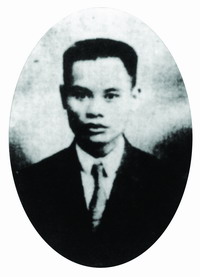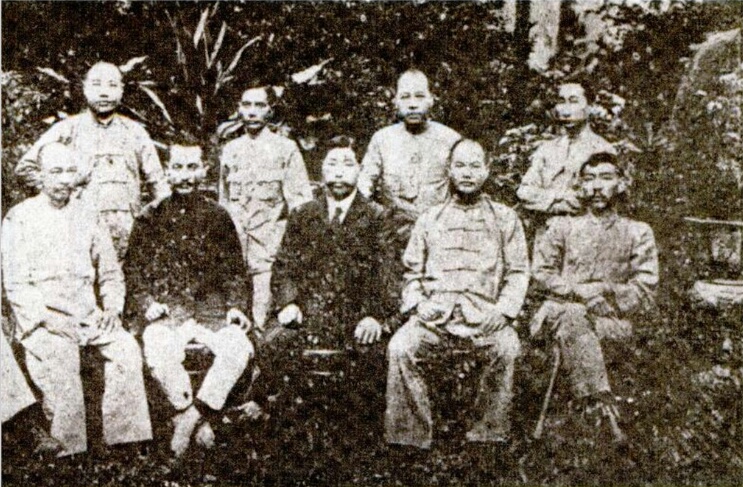|
Phạm Hồng Thái
Phạm Hồng Thái (1896–1924) was a Vietnamese people, Vietnamese activist, revolutionary and a member of Đông Du. He was responsible for the assassination attempt on Martial Merlin, the Governor-General of French Indochina, governor-general of French Indochina then visiting Guangzhou, China. Disguised as a journalist at the party given in Merlin's honor, Pham Hong Thai detonated the explosive device but failed to kill Merlin at the banquet. Hunted down by authorities, he chose to drown himself in the Pearl River (China), Pearl River to avoid capture. He was interred in the Huanghuagang Cemetery (Hoàng Hoa Cương in Vietnamese language, Vietnamese) Cemetery in Guangzhou next to 72 Chinese revolutionaries who died in the Second Guangzhou Uprising, Second Guangzhou uprising. Even though the assassination were unsuccessful, it fanned nationalist sentiments in Vietnam against French rule and intensified agitation among activists. References [Baidu] |
Vietnamese People
The Vietnamese people (, ) or the Kinh people (), also known as the Viet people or the Viets, are a Southeast Asian ethnic group native to modern-day northern Vietnam and Dongxing, Guangxi, southern China who speak Vietnamese language, Vietnamese, the most widely spoken Austroasiatic language. Vietnamese Kinh people account for 85.32% of the population of Vietnam in the 2019 Vietnamese Census, 2019 census, and are officially designated and recognized as the ''Kinh'' people () to distinguish them from the other ethnic groups in Vietnam, minority groups residing in the country such as the Hmong people, Hmong, Chams, Cham, or Muong people, Mường. The Vietnamese are one of the four main groups of Vietic languages, Vietic speakers in Vietnam, the others being the Muong people, Mường, Thổ people, Thổ, and Chứt people. Diasporic descendants of the Vietnamese in China, known as the Gin people, Gin people, are one of 56 ethnic groups officially recognized by the People's ... [...More Info...] [...Related Items...] OR: [Wikipedia] [Google] [Baidu] |
Đông Du
Đông Du (, , ''journey to the east''; ) was a Vietnamese political movement founded by Phan Bội Châu at the start of the 20th century that encouraged young Vietnamese to go east to Japan to study, in the hope of training a new era of revolutionary independent activists to rise against French colonial rule. Other notable proponents of Dong Du include Phan Châu Trinh and Prince Cường Để of Nguyễn house. In 1906 there were only 20 students in Japan, but October 1907, there were over 100 students in Japan, more than half from the South.Philippe M. F. Peycam – The Birth of Vietnamese Political Journalism: Saigon, 1916–1930 2012– Page 56 "During Chiêu's trial, the French discovered that he had been a central agent for an underground movement called the Association for the Modernization ... funds for the Đông du movement but also to promote these changes for their own sake." History At the beginning of the 20th century, France had suppressed almost all revolutionar ... [...More Info...] [...Related Items...] OR: [Wikipedia] [Google] [Baidu] |
Martial Merlin
Martial Henri Merlin (20 January 1860 – 8 May 1935; also Martial Merlin) was a French colonial administrator of the 19th and 20th centuries. He served as the governor-general of Guadeloupe (1901–1903), French West Africa (1907–1908 and 1919—1923), French Equatorial Africa (1908–1917), French Madagascar (1917–1918), and French Indochina French Indochina (previously spelled as French Indo-China), officially known as the Indochinese Union and after 1941 as the Indochinese Federation, was a group of French dependent territories in Southeast Asia from 1887 to 1954. It was initial ... (1923–1925). References External links and sources {{DEFAULTSORT:Merlin, Martial Henri 1860 births 1935 deaths French colonial governors and administrators Colonial governors of French Madagascar Governors-general of French Indochina Governors of French West Africa Governors of French Equatorial Africa French colonial governors of Guadeloupe ... [...More Info...] [...Related Items...] OR: [Wikipedia] [Google] [Baidu] |
French Indochina
French Indochina (previously spelled as French Indo-China), officially known as the Indochinese Union and after 1941 as the Indochinese Federation, was a group of French dependent territories in Southeast Asia from 1887 to 1954. It was initially a federation of French colonial empire, French colonies (1887–1949), later a confederation of French associated states (1949–1954). It comprised French protectorate of Cambodia, Cambodia, French protectorate of Laos, Laos (from 1899), Guangzhouwan (1898–1945), French Cochinchina, Cochinchina, and Nguyễn dynasty, Vietnamese regions of Tonkin (French protectorate), Tonkin and Annam (French protectorate), Annam. It was established in 1887 and was dissolved in 1954. In 1949, Vietnam was reunited and it regained Cochinchina. Its capitals were Hanoi (1902–1945) and Saigon (1887–1902, 1945–1954). The Second French Empire Cochinchina campaign, colonized Cochinchina in 1862 and established a French protectorate of Cambodia, protect ... [...More Info...] [...Related Items...] OR: [Wikipedia] [Google] [Baidu] |
Guangzhou
Guangzhou, Chinese postal romanization, previously romanized as Canton or Kwangchow, is the Capital city, capital and largest city of Guangdong Provinces of China, province in South China, southern China. Located on the Pearl River about northwest of Hong Kong and north of Macau, Guangzhou has a history of over 2,200 years and was a major terminus of the Silk Road. The port of Guangzhou serves as a transportation hub for China's fourth largest city and surrounding areas, including Hong Kong. Guangzhou was captured by the United Kingdom, British during the First Opium War and no longer enjoyed a monopoly after the war; consequently it lost trade to other ports such as Hong Kong and Shanghai, but continued to serve as a major entrepôt. Following the Second Battle of Chuenpi in 1841, the Treaty of Nanking was signed between Robert Peel, Sir Robert Peel on behalf of Queen Victoria and Lin Zexu on behalf of Daoguang Emperor, Emperor Xuanzong and ceded British Hong Kong, Hong Kon ... [...More Info...] [...Related Items...] OR: [Wikipedia] [Google] [Baidu] |
Pearl River (China)
The Pearl River (, or ) is an extensive river system in southern China. "Pearl River" is often also used as a catch-all for the watersheds of the Pearl tributaries within Guangdong, specifically the Xi ('west'), Bei ('north'), and Dong ('east'). These rivers all ultimately flow into the South China Sea through the Pearl River Delta. Measured from the farthest reaches of the Xi River, the Pearl– Xi– Xun– Qian– Hongshui– Nanpan Pearl River system constitutes China's third-longest, after the Yangtze River and the Yellow River, and its second largest by volume, after the Yangtze. The Pearl River Basin drains the majority of Guangdong and Guangxi provinces (collectively known as Liangguang), as well as parts of Yunnan, Guizhou, Hunan and Jiangxi; it also drains the northernmost parts of Vietnam's Northeast Cao Bằng and Lạng Sơn provinces. The Pearl River is famed as the river that flows through Guangzhou. As well as referring to the system as a whole, the ... [...More Info...] [...Related Items...] OR: [Wikipedia] [Google] [Baidu] |
Vietnamese Language
Vietnamese () is an Austroasiatic languages, Austroasiatic language Speech, spoken primarily in Vietnam where it is the official language. It belongs to the Vietic languages, Vietic subgroup of the Austroasiatic language family. Vietnamese is spoken natively by around 86 million people, and as a second language by 11 million people, several times as many as the rest of the Austroasiatic family combined. It is the native language of Vietnamese people, ethnic Vietnamese (Kinh), as well as the second language, second or First language, first language for List of ethnic groups in Vietnam, other ethnicities of Vietnam, and used by Overseas Vietnamese, Vietnamese diaspora in the world. Like many languages in Southeast Asia and East Asia, Vietnamese is highly analytic language, analytic and is tone (linguistics), tonal. It has head-initial directionality, with subject–verb–object order and modifiers following the words they modify. It also uses noun classifier (linguistics), classi ... [...More Info...] [...Related Items...] OR: [Wikipedia] [Google] [Baidu] |
Second Guangzhou Uprising
The Second Guangzhou (Canton) Uprising, known in Chinese as the Yellow Flower Mound Uprising or the Guangzhou Xinhai Uprising, was a failed uprising took place in China led by Huang Xing and his fellow revolutionaries against the Qing dynasty in Canton (Guangzhou). It is honored in Guangzhou's Yellow Flower Mound or Huanghuagang Park. History At this time Malaya, which included what is now Peninsular Malaysia and Singapore, had the largest Overseas Chinese population outside of China itself. Many of them were rich and carried out activities for the revolutionaries. On November 13, 1910, Sun Yat-sen, along with several leading figures of the Tongmenghui, gathered at the Penang conference to draw up plans for a decisive battle. The following day on November 14, 1910, Sun Yat-sen chaired an Emergency Meeting of the Tongmenghui at 120 Armenian Street (now the Sun Yat-sen Museum Penang) and raised Straits Dollars $8,000 on the spot. The planning events are known as the 1 ... [...More Info...] [...Related Items...] OR: [Wikipedia] [Google] [Baidu] |
1896 Births
Events January * January 2 – The Jameson Raid comes to an end as Jameson surrenders to the Boers. * January 4 – Utah is admitted as the 45th U.S. state. * January 5 – An Austrian newspaper reports Wilhelm Röntgen's discovery, last November, of a type of electromagnetic radiation, later known as X-rays. * January 6 – Cecil Rhodes is forced to resign as Prime Minister of the Cape Colony, Cape of Good Hope for his involvement in the Jameson Raid. * January 7 – American culinary expert Fannie Farmer publishes her first cookbook. * January 12 – H. L. Smith takes the first X-ray photograph. * January 16 – Devonport High School for Boys is founded in Plymouth (England). * January 17 – Anglo-Ashanti wars#Fourth Anglo-Ashanti War (1895–1896), Fourth Anglo-Ashanti War: British British Army, redcoats enter the Ashanti people, Ashanti capital, Kumasi, and Asantehene Agyeman Prempeh I is deposed. * January 28 – Walter Arnold, of E ... [...More Info...] [...Related Items...] OR: [Wikipedia] [Google] [Baidu] |
1924 Deaths
Events January * January 12 – Gopinath Saha shoots Ernest Day, whom he has mistaken for Sir Charles Tegart, the police commissioner of Calcutta, and is arrested soon after. * January 20–January 30, 30 – Kuomintang in China holds its 1st National Congress of the Kuomintang, first National Congress, initiating a policy of alliance with the Soviet Union and the Chinese Communist Party. * January 21 – Alexander Cambridge, 1st Earl of Athlone, The Earl of Athlone is appointed Governor-General of the Union of South Africa, and High Commissioner for Southern Africa.Archontology.org: A Guide for Study of Historical Offices: South Africa: Governors-General: 1910-1961 (Accessed on 14 April 2017) * January 22 – R ... [...More Info...] [...Related Items...] OR: [Wikipedia] [Google] [Baidu] |





